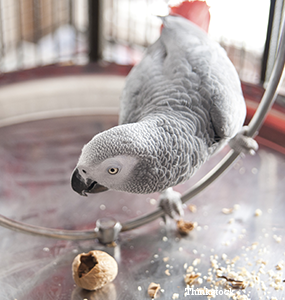
Dr. Laurie Hess, our avian and exotics expert, contributes regularly on the Pet Health Network about all things exotic.
It happens in malls across America every year. Somewhere between Build-a-Bear and the food court, an eight-year-old child races up to the pet store window, presses his face up against the glass, points to the large parrot perched inside, and shouts, “Mommy, Daddy, can we get him, PLEASE?” The parents then glance up at the window, see the colorful bird dancing on the other side of the glass and then at their child’s longing expression, and all reason leaves their bodies. They are mesmerized, and without thinking, before they know it, they are swiping their credit card and trying to cram the family SUV with a big metal cage, several bags of food, and a large feathered family member who is no longer sitting quietly but is now squawking loudly in the back seat. And so it begins…
Exotic pets – large and small, from parakeets to geckos to hedgehogs – can make wonderful companions, but unfortunately, many are purchased on a whim. Many exotic pets are highly intelligent creatures that require a great deal of attention and care. They can thrive in the right homes, but they are often bought impulsively by people who have very little knowledge of what they require. As a result, many birds end up being relinquished to shelters, or worse, they remain in homes where they are ignored. Many reptiles are released into the backyard where, not knowing how to survive, they are killed by predators. Many bunnies are banished to the basement where they languish in small cages.
Before you purchase an exotic pet, you might want to ask yourself the following questions:
Do I live in a home conducive to owning this type of exotic pet?
This is a fundamental question you must answer before even considering adopting or purchasing any kind of exotic animal. This really means, can you and your family tolerate the noise of a parrot, the frequent droppings of a rabbit or guinea pig, or the large tank and constantly bubbling water filtration system needed by a turtle? Parrots naturally chatter and squawk early in the morning and at dusk, around feeding time. Plus, large bird and mammal cages (and toys and bedding and supplies) can take up a great deal of space. Small-apartment dwellers (with nearby neighbors and limited storage space) might not be able to tolerate these noise and space restrictions. Also, little children and large birds or mouthy small mammals, like young ferrets, often don’t mix; these pets may be scared by kids’ quick movements and loud voices, so that they may scream or nip in reaction. So, if you have a baby or toddler, you may want to pass on the parrot or small mammal until the kids reach elementary school.
 Do I have time to care for an exotic pet?
Do I have time to care for an exotic pet?
In the wild, birds often live in flocks of hundreds to thousands. Other exotic pets, such as sugar gliders, are also very social creatures that need constant contact and interaction with their family members (not just other sugar gliders but you, too) to prosper and remain healthy. When they are ignored or left alone for long periods, they may bite or mutilate their own skin. Without proper socialization and frequent handling, some pets like ferrets, hamsters, degus, rats, and other small rodents may withdraw or become nippy. Also, most exotic pets need water and food (including fresh produce for some) twice a day, plus weekly complete cleaning and daily spot cleaning of their cages. This all adds up to several hours a week in playtime, feeding, and cleanup – not something all of us who work long hours outside our homes can readily spare. So, if your time is already spread thin, certain socially demanding exotic pets – like birds, ferrets, and rodents - may not be the best choice for you.
Do I have the lifestyle suited to owning an exotic pet?
Many exotic animals are homebodies that generally don’t like change. When they are moved into new environments, they sometimes stop eating and can take days to weeks to adjust. Plus, we already noted how attached they become to their mates. As a result, they sometimes don’t acclimate easily to unfamiliar surroundings like boarding kennels. So if you travel a lot, or if you’re often gone from morning until midnight, a fish or two might be better for you.
Do I have the finances to take care of an exotic pet?
This is a question that almost no one considers. While many people will shell out hundreds to thousands of dollars to purchase an unusual exotic pet, very few consider what happens next. Many of these animals require fresh food daily which can add up on your grocery bill. Plus, some will chew up expensive toys in just a few minutes. And what happens when your pet becomes ill? Very few people take their exotic pets for regular veterinary check-ups, and even fewer take out exotic pet insurance policies, as they do for their dogs or cats. So when their animals get sick, they may be hit with a veterinary bill they didn’t expect. If your budget will be maxed out if you make that exotic pet purchase, you may want to wait a little and save so you have funds available for exotic pet medical care.
That all said, if you can answer these questions with an honest, “yes,” that exotic animal in the pet shop window can be an entertaining, loving companion that will bring you years of joy.
If you have any questions or concerns, you should always visit or call your veterinarian – they are your best resource to ensure the health and well-being of your pets.
